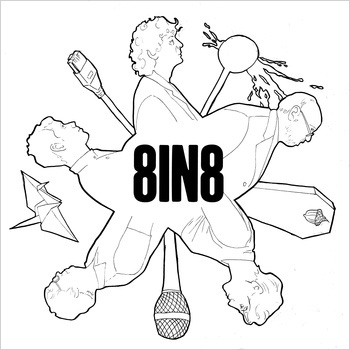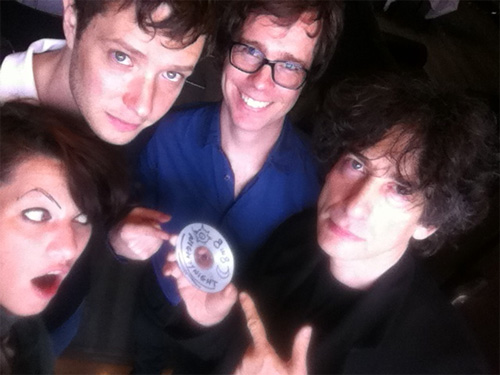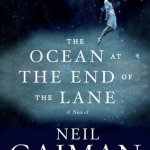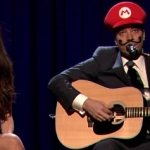The Setup
The members of 8in8 are no strangers to bucking the system. Amanda Palmer (from the Dresden Dolls) puts out her music online at Bandcamp (where it can be heard for free and then purchased for a small pittance, or whatever larger amount the listener decides) and believes in a new patronage system for creative arts. Neil Gaiman argues persuasively that allowing “pirating” of his work actually brings him more readers who then buy his books. Ben Folds, at least at one time (Ben Folds Five is listed on the Band that Allow Taping web site), appears to allow people to tape his live shows (thus getting music for free) as long as they do so unobtrusively (though he doesn’t seem to have an official policy). And Damian Kulash, with his band OK Go, last year left EMI and created a new music label in order to allow more musical creativity. All four are also heavy users of Twitter. So it makes a crazy sort of sense that they would collaborate on and record eight songs in eight hours (well, really six in twelve, but who’s counting), with input from their fans, bypassing the usual distribution and production methods while relying heavily on the Internet. They then put the music on Bandcamp and performed it live the next night (along with a few of their own tracks, including a “cover” of a recent mash-up of Gaiman reading from his introduction to Who Killed Amanda Palmer? with Ben Folds’s “You Don’t Know Me.”).
The Recording
The entirety of the project was broadcast live online. Gaiman wrote lyrics in the background while the others sang and played the various instruments (all three musicians play multiple instruments and sing on the album. You can also hear Gaiman clapping [with several others, so maybe not] on “One Tiny Thing” as well as singing [yes, Neil Gaiman sings…] on “The Problem With Saints”). The most fascinating aspect had to be watching the creative process. Despite all the lyrics being written by the same person, each song took on the characteristics of the main performer. But then when the other parts got added in, it actually felt like a real collaboration. Because of this, I found myself watching the first eight hours, something I hadn’t intended to do. I was, however, just too sleepy to stay up any longer despite being a teacher on Spring Break.
The Music
Six songs in twelve hours makes for an average of two hours per song (obviously). The songs themselves feel complete; they are not simply throw-away tracks. Could they be improved with time? Sure, but that’s almost certainly true of nearly any creative endeavor. Several people on Twitter commented that they had the songs running through their heads before they were even finished. Similarly, I found myself singing along the first time I listened to the album. That has to be some measure of success (though, admittedly, I get Ms. Black’s “Friday” stuck in my head all the time, so it’s not the only measure).
“Nikola Tesla” began with Neil Gaiman asking Twitter to tweet him names of somebody famous. Tesla’s name popped up several times so Gaiman went to work writing what turned out to be a love song, which Amanda Palmer turned into her own style. Ben Folds’s style dominates “Because the Origami,” a song he began writing that Gaiman finished. I don’t want to spoil the enjoyment of discovery of what the title actually means, but suffice it to say it made several people (myself [and Amanda Palmer herself] included) cry upon hearing it. Then Damian Kulash gets a turn on “One Tiny Thing.” I’d love to see an OK Go style video for the song with tiny things destroying much larger things. “Twelve Line Song” is based on another of Gaiman’s Twitter requests, this one for something that happened only once. Someone mentioned a squirrel that committed suicide in their toilet, Gaiman changed it to a bath, and the song was born. Interestingly, this one probably feels the most collaborative.
Next up is a track inspired by a famous Boston “street personality” that some of the musicians encountered that morning, the Mirror Lady of Westland and Hemenway. Finally, we get “The Problem with Saints,” which, as I mentioned earlier, features Neil Gaiman singing. He claimed in the post-recording talk at Berklee that he didn’t intend to sing it, but he needed a one syllable word for vacation. Since the only one he could think of was “hols,” short for “holidays,” and since that’s clearly a British term, the song suddenly had to be sung by a Brit. Of course, I suspect he may have had it somewhat in the back of his mind that he’d have to sing so he subconsciously made it so. Besides, having a Brit sing about Joan of Arc attempting to defeat the British just works so well.
The Final Verdict
So, was the project a success? That depends on what your take on their goal was. Some seem to think that it was a rebellion against the music industry (admittedly, a press release did state that the project would “show how record companies are becoming superfluous to building buzz and distributing music”). Others viewed it as “the tyranny of novelty,” in which artists always have to do something new in order to get attention. When I first heard about it, I thought it was similar to what Jonathan Coulton did with his Thing a Week project or what Cory Doctorow has done by releasing his work for free under Creative Commons licensing or even how Scott Sigler managed to crack the New York Times best-seller list on the power of giving his stuff away for free in podcast form, then selling the actual books. Musicians and writers (and other creative types, no doubt) have harnessed the power of the Internet and given away free content as a viable method for attracting an audience who then pay for products in order to support artists they care about. The obvious difference with this collaboration is that the artists involved are already established.
Of course, none of that really answers the question. While watching the live stream, I realized that none of those goals really fit with what I was seeing. Sure, there’s some novelty to the idea, but really what it boiled down to was an attempt to make some really cool music. In that sense, it was a success. Okay, sure they didn’t make eight songs in eight hours, but they did put out six quality songs in twelve hours. That’s pretty impressive. What’s the quote? Shoot for the moon because even if you fail you’ll land among the stars (yeah, okay, it doesn’t really work out astronomically, but the point remains…).
In the end, I think Amanda Palmer’s tweet sums it up rather nicely: “six is close to eight / everyone should forgive us / we are still awesome.” Yes, you all are.








